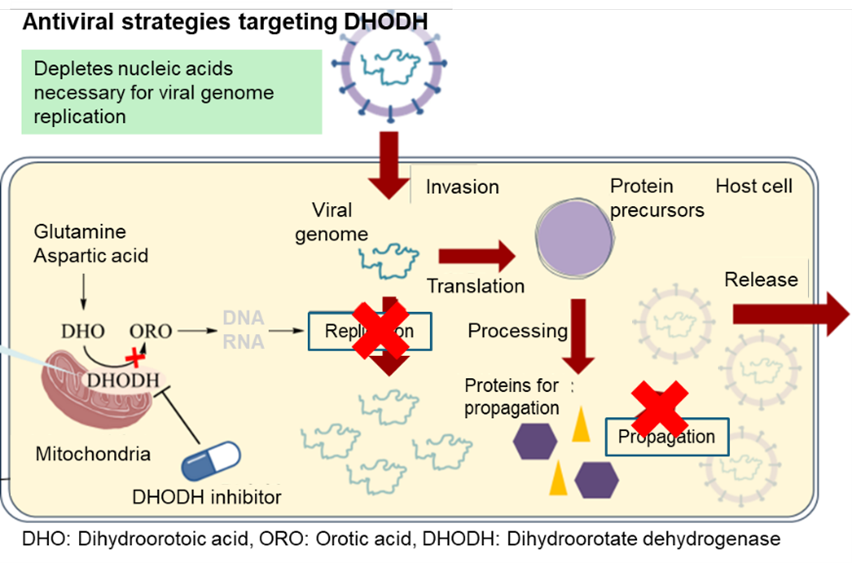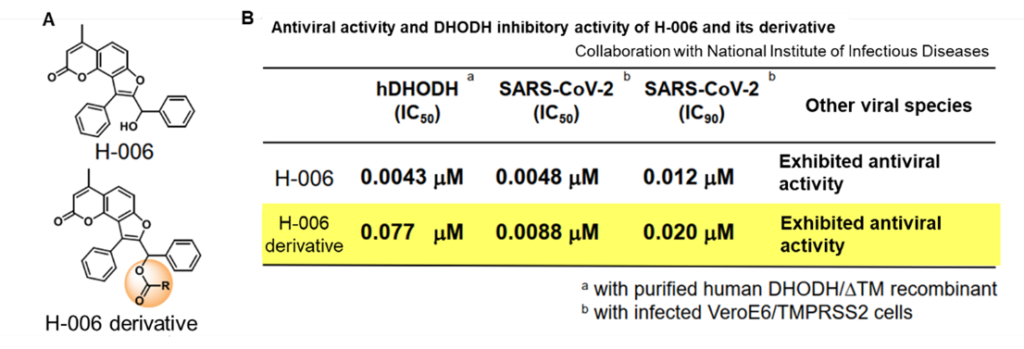Advantage and Core Benefit
- Applicable to a wide variety: not restricted to specific viruses, but can be applied to a wide range of viral species
- Potent inhibitory activity: strong inhibitory activity at low concentrations, expected to have low risk of side-effects
- Reduced risk of drug resistance: targets host metabolic enzymes and therefore has low risk of drug resistance
 |
Background and Technology
There is a need for the development of antiviral drugs aimed at preparedness against a wide variety of virus species, including emerging and re-emerging ones. One of the measures to prevent pandemics of viral infections is to deter the spread of infection through early treatment. To realize early treatment of emerging viral infections, it is important to develop drugs that target biomolecules and phenomena commonly involved in viral multiplication and infection, rather than conventional methods that target enzymes and other factors specific to viral species.
Inventors have developed small molecule targeting the human metabolic enzyme DHODH (dihydroorotate dehydrogenase). DHODH is involved in the de novo biosynthesis of pyrimidine nucleic acids, which make up DNA and RNA. Depletion of the intracellular nucleic acid pool by DHODH inhibition prevents nucleic acid-demanding viral growth. It is also expected to suppress the excessive immune response that causes cytokine storms.
H-006 exhibits potent inhibitory activity at lower concentrations than existing DHODH inhibitors and has been shown to exhibit growth inhibitory activity against cancer cell lines and against various viruses, including SARS-CoV-2, Monkeypox virus (MPXV) and dengue virus (DENV). Furthermore, the development of derivatives based on H-006 has made it possible to adjust physical properties such as solubility, and some derivatives have also shown prodrug-like activity. Tests using infected animal models are currently underway.
Data
 |
- Structure of H-006 and H-006 derivatives (A). Enzyme inhibition and antiviral activity against DHODH and SARS-CoV-2 (B); IC50 values on the order of nM against MPXV and DENV.
Patent & Publication
Patent pending (not yet published)
Researcher
Dr Shogo Watanabe, Dr Hiroyuki Nagata, Dr Kenji Watanabe (Faculty of Pharmaceutical Sciences, University of Shizuoka), National Institute of Infectious Diseases, RIKEN
Expectations
We wish to conduct joint research with companies capable of conducting clinical trials for the practical application of this technology. We look forward to collaborating with companies that develop antiviral drugs and have technologies for evaluating pharmacological activity and animal studies. We can also consider joint research in various disease areas involving viral infections. Compounds for initial evaluation of this technology can also be provided (for a fee).
Project.WL-04991


